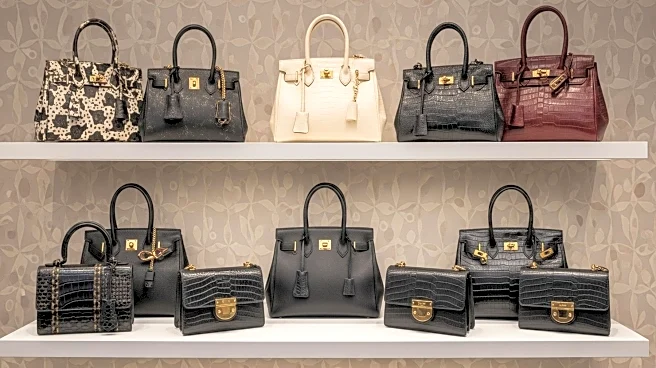What is the story about?
What's Happening?
Louis Vuitton has initiated legal action against United Monograms, accusing the company of counterfeiting and trademark infringement. The lawsuit, filed in the U.S. District Court for the Southern District of New York, claims that United Monograms is selling apparel and accessories that imitate Louis Vuitton's distinctive trademarks without authorization. Louis Vuitton argues that United Monograms is leveraging the luxury brand's reputation to market low-cost products, such as sweatshirts, by using direct references to Louis Vuitton's monogram and Damier patterns. The French luxury brand is seeking injunctive relief, monetary damages, and the disgorgement of United Monograms' profits, asserting that the company is deliberately trading off the goodwill associated with the Louis Vuitton brand.
Why It's Important?
This lawsuit underscores the ongoing battle luxury brands face against counterfeit and imitation goods. For Louis Vuitton, protecting its trademarks is crucial to maintaining its brand integrity and market position. The case highlights the tension between marketing imitation goods and legal definitions of counterfeiting. As 'designer dupes' become more prevalent, luxury brands are increasingly vigilant in defending their intellectual property rights. The outcome of this lawsuit could set a precedent for how similar cases are handled, impacting both the fashion industry and consumer perceptions of 'dupe' products. If successful, Louis Vuitton's legal action may deter other companies from engaging in similar practices, thereby safeguarding the value of luxury trademarks.
What's Next?
The legal proceedings will likely involve a detailed examination of United Monograms' marketing practices and product descriptions. The court's decision could influence future trademark infringement cases, particularly in the fashion industry. Stakeholders, including other luxury brands, will be watching closely, as the case may affect how they approach trademark protection and marketing strategies. Additionally, consumer advocacy groups might weigh in on the implications for consumer rights and transparency in product marketing. The resolution of this case could lead to stricter enforcement of trademark laws and potentially reshape the landscape of the 'dupe' economy.
Beyond the Headlines
The lawsuit highlights broader issues in the fashion industry, such as the ethical considerations of marketing imitation goods. It raises questions about consumer awareness and the potential for confusion between genuine and imitation products. The case also touches on cultural aspects of luxury consumption, where owning branded items is often associated with status and identity. As the 'dupe' economy grows, it challenges traditional notions of luxury and authenticity, prompting discussions about the value and meaning of brand ownership in contemporary society.















